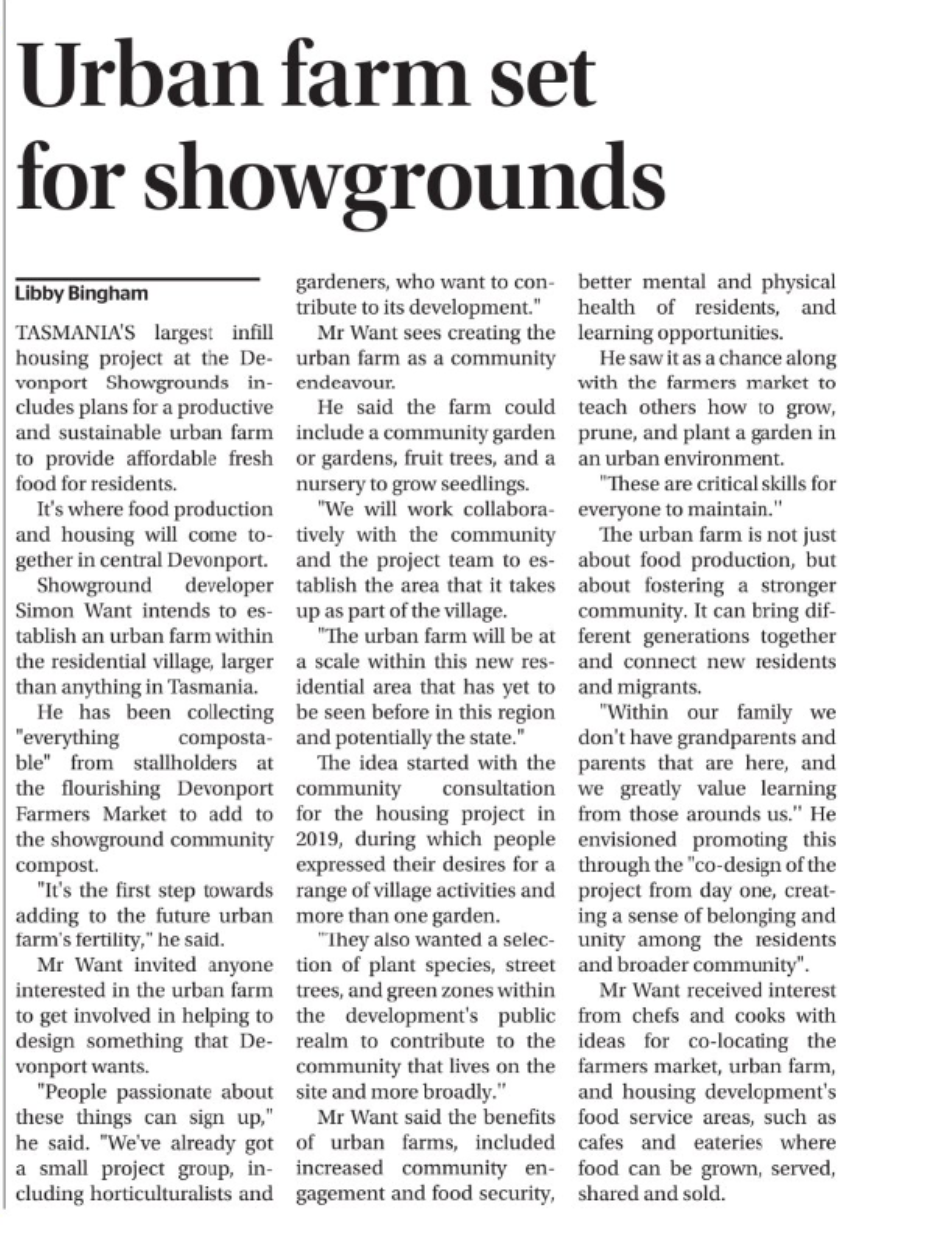Plans for Tasmania's largest urban farm part of showgrounds development
Tasmania's largest infill housing project at the old Devonport showgrounds includes plans for a productive and sustainable urban farm to provide affordable fresh food for residents. It's where food production and housing will come together in central Devonport. Showground developer Simon Want intends to establish an urban farm within the new residential village, he thinks is bigger than anything in the state.
People working in the Cape Community Farm in Victoria. Devonport Showground developer Simon Want said the very productive urban farm is an example of what can happen here. Picture Facebook
In preparation, he has been gathering "all compostable items" from stallholders at the thriving Devonport Farmers Market to add to the showground community compost.
Developer Simon Want and farmers market stallholder chef Brielle Mason from Nomad Global Kitchen add to the showground compost. Picture Facebook.
"It's the first step towards adding to the future urban farm's fertility," he said.
Mr Want invited anyone interested in the urban farm to get involved in helping "design something that Devonport wants".
"People passionate about these things can sign up," he said.
"We've already got a small project group, including horticulturalists and gardeners, who want to contribute to its development."
Mr Want sees the urban farm as a community endeavour.
He said the showground village farm could include a community garden or gardens, fruit trees, and a nursery to grow seedlings.
"We will work collaboratively with the community and project team to establish the area it takes up," he said.
"The urban farm will be at a scale within this new residential area that has yet to be seen before in this region and potentially the state."
The idea started with the community consultation for the housing project in 2019, during which people expressed their desires for a range of different village activities and more than one garden.
The Cape Community Farm in Victoria. Picture website.
"They also wanted a selection of plant species, street trees, and green zones within the development's public realm to contribute to the community that lives on the site and more broadly," Mr Want said.
He cited the Cape Community Farm in Victoria as an example of what could happen in Devonport.
Mr Want said the benefits of urban farms, included increased community engagement and food security, better mental and physical health of residents, and learning opportunities.
He saw it as a chance along with the farmers market to teach others how to grow, prune, and plant a garden in an urban environment.
"These are critical skills for everyone to maintain," he said.
The infill housing project at the Devonport showgrounds includes plans for an urban farm and central lake. Image supplied.
The urban farm is not just about food production, but about fostering a stronger community.
It can bring different generations together and connect new residents and migrants.
"Within our family we don't have grandparents and parents that are here, and we greatly value learning from those arounds us," Mr Want said.
He envisioned promoting this through the "co-design of the project from day one, creating a sense of belonging and unity among the residents and broader community".
Mr Want received interest from chefs and cooks with ideas for co-locating the farmers market, urban farm, and housing development's food service areas, such as cafes and eateries where food can be grown, served, shared and sold.
"The showground will become a village within the city with community and commercial activities with the urban farm and farmers market forming the heart of the village."
-
The Advocate
17
- 27 May 2024 Plans for Tasmania's largest urban farm part of showgrounds development 27 May 2024
- 20 Apr 2024 'Super lots' revealed in next stage of Devonport Showground redevelopment 20 Apr 2024
- 6 Jan 2024 Happy market organisers celebrate 'a hearty hub of community goodness' 6 Jan 2024
- 28 Apr 2023 Devonport Showground racing infrastructure set to get demolished 28 Apr 2023
- 26 Oct 2022 Devonport Showground rezoning approval makes way for developer to build 200 homes 26 Oct 2022
- 22 Apr 2022 Well-loved Devonport Farmers Market kicks off this weekend at Devonport Showground 22 Apr 2022
- 24 Feb 2022 Housing project hinges on Devonport Showground rezoning 24 Feb 2022
- 11 Nov 2020 Track fix: cash splash breaks battle 11 Nov 2020
- 28 Jul 2020 Devonport needs better housing: Want 28 Jul 2020
- 18 Jul 2020 Urban design expert says showground project could become regional prototype 18 Jul 2020
- 17 Jul 2020 Developer seeks feedback 17 Jul 2020
- 8 Jul 2020 Call to sort out showground beef 8 Jul 2020
- 7 Jul 2020 Urban infill project must deliver for Devonport 7 Jul 2020
- 7 Jul 2020 Plans on show, developer unveils $75m plan 7 Jul 2020
- 13 May 2019 Showground sale was financially necessary 13 May 2019
- 18 Apr 2019 Devonport Showground sale deal should be a winner 18 Apr 2019
- 18 Apr 2019 Show site sale a sign of the times 18 Apr 2019
-
Tasmania Talks
2
- 6 Aug 2020 On air with Aaron Stevens, July 28 6 Aug 2020
- 7 Jul 2020 On air with Aaron Stevens, July 7 7 Jul 2020
-
7AD FM
2
- 6 Aug 2020 On Air With Martin Agatyn, July 28 6 Aug 2020
- 7 Jul 2020 Interview with Martin Agatyn, July 7 7 Jul 2020
-
7 Tasmania
1
- 8 Jul 2020 7 Nightly News, 7th July 2020 8 Jul 2020
-
The Mercury
1
- 7 Jul 2020 Showground developer submits plans to Devonport City Council 7 Jul 2020
-
Sea FM
1
- 7 Jul 2020 On air with Lee & Jess 7 Jul 2020
-
ABC Radio Hobart
1
- 7 Jul 2020 On air with Sarah Gillman, July 7 7 Jul 2020

